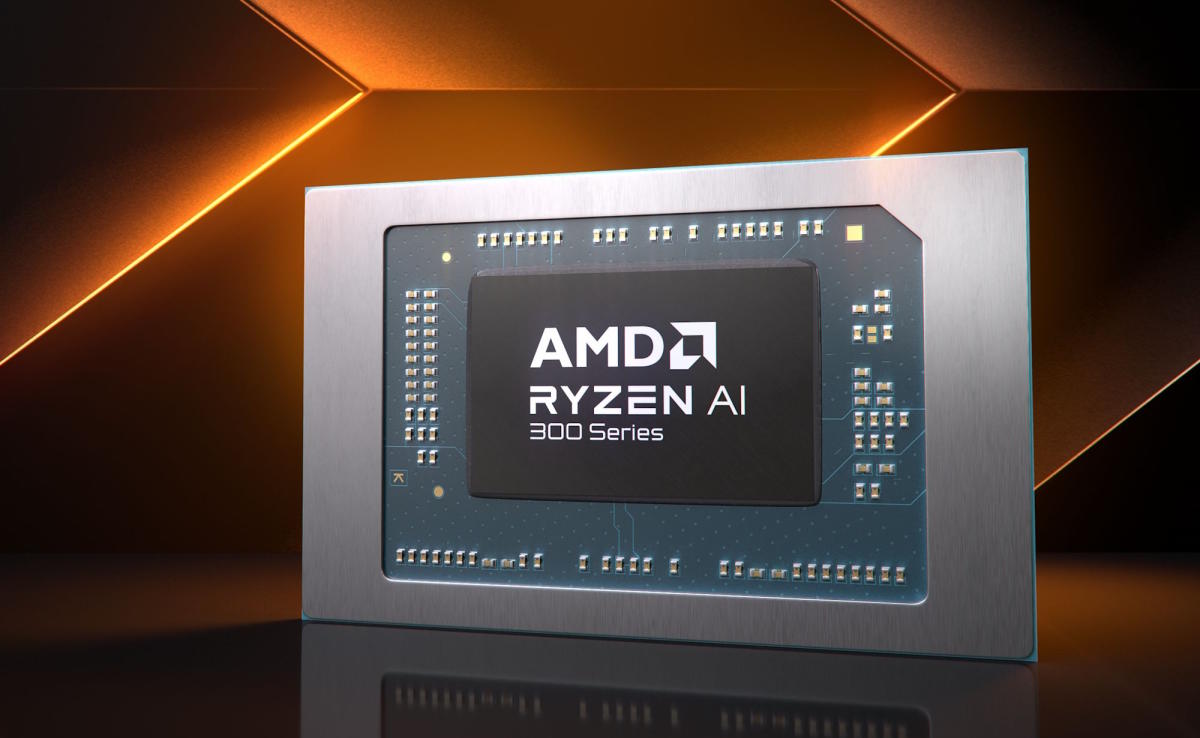Microsoft’s Copilot+ initiative for super-charged AI PCs is becoming more of a reality at Computex 2024. Today, AMD announced its next major chip platforms, Ryzen AI 300 for notebooks and Ryzen 9000 for desktops, which respectively target beefier laptop AI performance and fast gaming on desktops. Notably, Ryzen AI 300 chips feature a revamped neural processing unit (NPU) with 50 TOPS (tera operations per second) of AI performance, more than three times AMD’s previous laptop hardware. The new desktop processors, meanwhile, are reportedly 16 percent faster than their predecessors when it comes to overall performance.
The key takeaway from these announcements is that Qualcomm is no longer the only company able to gloat about fast AI hardware for Copilot+ PCs. That initiative, which Microsoft unveiled a few weeks ago, sets a new baseline specification standard for AI PCs. Copilot+ PCs require an NPU with at least 40 TOPS of AI performance, 16GB of RAM and 256GB SSDs to qualify as Copilot+ notebooks. Microsoft also tied together long battery life with the initiative, but it’s unclear if the Ryzen AI 300 chips will be able to touch the reported twenty-plus hours from Qualcomm’s latest Snapdragon processors. (We’re also expecting Intel to respond with more details about its Lunar Lake Copilot+ chips later today at Computex.)
So far, AMD’s new laptop chips include two models: The 12-core Ryzen AI 9 HX 370, and the 10-core AI 9 365. As usual, we expect the company to fill out its lineup over the next year with mid-tier and lower-end offerings. Both Ryzen AI 9 chips reach at least 5GHz max boost speeds, and they also feature built-in RDNA 3.5 Radeon 890M and 880M graphics. According to AMD’s benchmarks, the Ryzen AI 9 HX 370 is 98 percent faster than Apple’s M3 chip in Blender, and it’s 73 percent faster than Intel’s Core Ultra 185H. (It’s worth noting company tested its hardware with 32GB of RAM against Apple and Intel systems with 16GB of RAM, according to its testing footnotes.)
Powering both the Ryzen AI 300 and Ryzen 9000 chips is AMD’s Zen 5 architecture, which is a “sweeping update” for the company, Senior Processor Technical Marketing Manager Donny Woligrosky said in a media briefing. He claims it offers better branch prediction (which helps with accuracy and latency), higher overall throughput and up to two times better instruction bandwidth. For regular users, that means you can expect Zen 5 systems to feel a bit more responsive and be better primed for handling large data loads.
While AMD’s new AI chips are the star of the show, the company isn’t leaving desktop users behind. The new Ryzen 9000 chips top out with the 16-core Ryzen 9 9950X, which edges close to the 6GHz dream with 5.7GHz boost speeds. It’s a power-hungry beast though, requiring 170 watts, so more reasonable hardware nerds might want to opt for the Ryzen 9 9900X (120W TDP) or the eight-core Ryzen 7 9700X (65W). These new chips don’t include NPUs like the Ryzen 8000G, but at this point, gamers and demanding PC users can make do with the raw computational power from desktop CPUs and powerful GPUs. (NVIDIA is also trying to power some AI features with its RTX GPUs, which eschews the need for a standalone NPU.)
Alongside these new desktop chips, AMD is also unveiling the X870E and X870 AM5 chipsets. They include the next-gen PC features you’d expect, including PCIe 5, USB4, WiFi 7 and DDR5. For its older AM4 hardware, AMD also unveiled the 16-core Ryzen 9 5900XT and eight-core Ryzen 7 5800XT, which can both hit 4.8GHz speeds.
We’re still awaiting pricing details on AMD’s new hardware, but the company says we can expect to see Ryzen AI 300 systems and Ryzen 9000 chips in July. Those new laptops include the ASUS ZenBook S 16 and Zephyrus G16, as well as the MSI Stealth A16 AI+.




